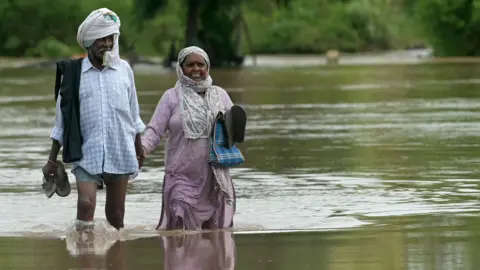In a remarkable display of love and resilience, couples in the Philippines are celebrating their weddings in submerged churches due to severe flooding. Recently, Jamaica Aguilar walked down the flooded aisle of the Barasoain Church, near Manila, dressed in a beautiful wedding gown, all while her guests waded through nearly knee-deep water. Despite the challenges posed by the torrential rains, compounded by a seasonal monsoon and a typhoon, the couple decided to go ahead with their wedding, focusing on what truly mattered—their union.
This wasn't an isolated incident; similar scenes have emerged from the same church during this time of year for the past few years. In fact, two years ago, another couple found themselves in the same predicament, and a flooded ceremony took place in Bulacan province in 2018. These wedding ceremonies have gone viral, serving as both a testament to Filipino resilience and a stark reminder of ongoing climate challenges.
To prepare for potential health issues following their wedding in the flood, the newlyweds, Jamaica and her husband Jade Rick Verdillo, quickly took doxycycline, an antibiotic to ward off leptospirosis, a waterborne disease common in flooded areas. Hours after their joyous celebratory event, the church hosted a funeral—further illustrating the dual realities of life and loss in flood-affected regions.
Typhoon Wipha and other storms have wreaked havoc across the Philippines, displacing tens of thousands and resulting in multiple fatalities. As the rainy season continues, there's little reprieve expected in the form of improved weather, exacerbating the flood situation with an aging sewage system and increasing urban development challenges.
Manila's mayor, Manuel Bonoan, stated that the city's aged and silted sewage infrastructure contributes significantly to the periodic flooding. The Philippines is home to over 13 million residents in Metro Manila alone, making waste management and drainage a considerable challenge. Experts indicate that historical urban planning decisions, including roads that obstruct natural waterways, need to be reconsidered.
Addressing these ongoing flood issues requires comprehensive planning and resources, which the Philippine government has begun to strategize in partnership with the World Bank. Meanwhile, couples like Mr. Verdillo remain hopeful that improved government investment in flood management will mean that future weddings can take place on dry ground. They emphasize that while it won't happen overnight, progress can be achieved with sustained focus on mitigating flooding hazards.




















